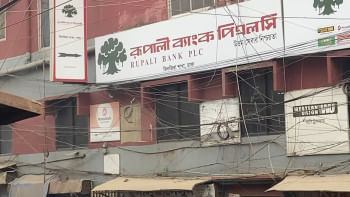Reeling from terror blow
The recent attacks on two young publishers have further shrunk the space for the country's creative book publishing industry, which is already struggling to survive against the advent of digital technology.
Publishers and writers say that despite the vacuum created by the death of popular writer Humayun Ahmed, who had attracted a huge pool of young readers since the late 1980s, the publishing scene has been vibrant with young publishers setting a new trend to bring out books on science, philosophy and humanism.
"Over the past eight to 10 years, young men and women have joined the publishing industry. They have tried to broaden its horizon by publishing different kinds of books which represent Bangladesh's intellectual practices and basic values," said Mofidul Hoque, publisher of Sahitya Prakash.
Hassan Zaidi of Pearl Publication told The Daily Star, "We had been focusing on science writing because there has been a demand for this genre in the market."
But the attacks on Faisal Arefin Dipan and Ahmedur Rashid Tutul, who have published many books by freethinking writers, have sent a clear message to all publishers with a progressive bent of mind.
Dipan was brutally killed by suspected religious extremists on October 31 and Tutul, along with two writer-bloggers Ranadipam Basu and Tareq Rahim, were brutally injured around the same time on the same day. The injured three are undergoing treatment at Dhaka Medical College Hospital.
Many publishers are now in a dilemma about publishing books on any sensitive issue.
Meshbah Uddin Ahmed, publisher of Admad Publishing and also acting secretary of Academic and Creative Publisher's Association of Bangladesh, told The Daily Star, "We are talking among ourselves about what we can publish and what we cannot. No one wants to get assaulted for publishing a book."
Robin Ahsan of Srabon Prokashan said, "Even if we bring out such books, we'll have difficulty marketing them as no bookshop will want to display them fearing attack."
Talking about the publishing ventures of Dipan and Tutul, writers have said they were very popular among young writers.
Young poet Pranto Palash said, "In fact, Tutul bhai brought out the largest number of books by young writers during the last Ekushey book fair."
He said both of them had openly announced that they would not publish any books by fundamentalists.
Talking to this correspondent, Mahrukh Mohiuddin, director of Marketing and Business Development of University Press Limited, said it was only likely that publishers, in this context, would be more careful in bringing out books on sensitive issues.
When asked if publishers would refrain from publishing a writer whose works deal with sensitive religious issues, Sharifa Bulbul of Balaka Prokash said, "The publishing decision is made on the quality of one's writing, not on what he believes or does not believe."
She said despite all threats she'd continue to bring out books by free thinkers. "We cannot sit quietly. We are not afraid but worried."
"Each person has his right to practice his religion. Just like we have right to be Muslims, Hindus, or Christians, a person has the right to be an atheist," she added.
Publishers also said the financial impact of this pressure on progressive publishing would not be significant.
Murshid Anwar, deputy director of Bangla Academy, said, "Nonfiction books, which include research work and essays on social, cultural, political, religious, literary and economic issues, constitute only 20% of the total sale of books at the Ekushey book fair and the readership of this is mostly limited to researchers and students."
Such books make up a small portion of the entire industry of books, said Mostafa Salim, executive director of Academic & Creative Publishers Association of Bangladesh.
"If books on sensitive religious issues are not published, there would not be any loss to business. But the space for free, new and advanced thoughts would become limited."
Milan Nath, publisher of Anupam Prakashani, said, "Publishers are not people of a separate island. If there is no place for tolerance in the society then works of various kinds and genres cannot be published."
Mofidul Hoque said, "A society needs free thoughts and ideas. It is the government's responsibility to ensure tolerance in the society and protect and support those who promote a vibrant creative future."


 For all latest news, follow The Daily Star's Google News channel.
For all latest news, follow The Daily Star's Google News channel. 



Comments